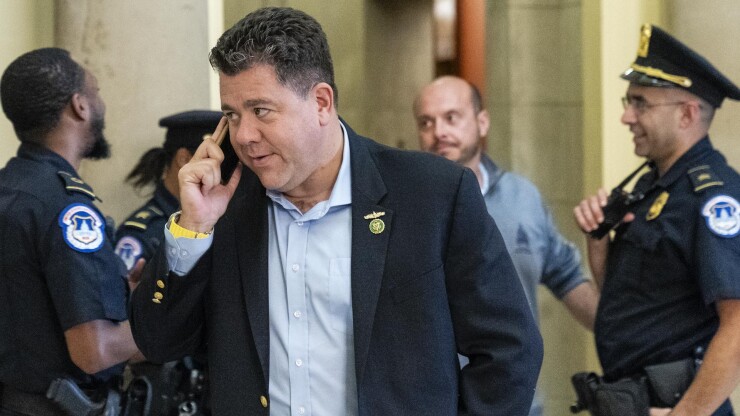
A New York congressman says raising the limit on state and local tax deductions is a matter of fairness and also of something else: vote math.
In an interview with The Bond Buyer Wednesday, Rep. Nick LaLota, R-N.Y., said he is among a group of five House Republicans each prepared to vote against the tax and spending cut package that is key to President Donald Trump's agenda if they don't get the SALT cap increase they want. The sweeping domestic policy bill is expected to include an extension of major provisions of the 2017 Tax Cuts and Jobs Act, and an increase in the SALT cap could spur lawmakers to look more aggressively at options such as the municipal bond tax exemption to offset the revenue "lost" by raising the cap.
While votes of blue state Republicans were not needed back when the decision was made to implement an "anti-blue state policy" like capping the SALT deduction to pay for provisions of the TCJA the "political situation" is different now, LaLota said.
Republicans currently hold only a 220-213 lead in House membership, with two vacancies. That means that any meaningful defection from the ranks threatens the GOP's ability to pass the reconciliation bill at all, unless it gets unlikely crossover support from Democrats.
"The Republican conference needs the votes of blue state Republicans from very SALTy districts like mine," he said, adding that New York State taxpayers send much more money to Washington than New York gets back.
"We're donor states, yet some of these red states get much more back from Washington than they give," LaLota said. "So it's a matter of fairness, it's a matter of equity, it's a matter of righting what was wrong in 2017. It's a matter of vote math – in order for this bill to pass, our interests must be addressed."
The federal deduction on state and local taxes was capped at $10,000 as part of the 2017 TCJA. The cap, long a
Trump himself also signaled on the campaign trail that he was prepared to
For the municipal bond market, the issue is important because high-tax states say the SALT cap limits their taxing flexibility, and the buyside believes the cap increases demand for tax-exempt munis.
LaLota said he remains optimistic that House Speaker Rep. Mike Johnson, R-La., "will usher in a [SALT cap] number that works for both my constituents and the country."
However, as Politico
"I don't see that there's a real interest from anybody, Republican or Democrat, in helping millionaires and billionaires," Rep. Nicole Malliotakis, R-N.Y., a member of the SALT caucus and the House Ways and Means Committee, said according to Politico. "There's a lot of opinions on that, but I support some type of income cap, or at a minimum, just targeting to take in middle class families."
Differences over the SALT cap, much like the ongoing debates surrounding safety net programs such as Medicaid and the Supplemental Nutrition Assistance Program, or SNAP for short, "have the ability to vastly slow, if not derail the current deliberations," said Brett Bolton, managing director, federal legislative affairs, at the Bond Dealers of America.
"We are watching SALT in particular as Ways and Means has jurisdiction and this policy change will likely represent a huge revenue loss on the committee ledger, potentially impacting munis downstream as they work to make the numbers add up," Bolton said.
While the current era isn't the first time that Congress has targeted the
According to the Politico story, Malliotakis last week suggested "that a proposal to lift the current $10,000 cap on the deduction should aim to cover individuals 'under the $400,000-500,000 range.'"
Malliotakis "is not one of the five," LaLota said, adding that in addition to himself, the other members of the group include Rep. Andrew Garbarino, R-N.Y.; Rep. Mike Lawler, R-N.Y., Rep. Young Kim, R-Calif., and Rep. Tom Kean, Jr., R-N.J.
"She's on the Ways and Means Committee and has a different view on these things more in line with her chairman from Missouri," LaLota said of Malliotakis.
Rep. Jason Smith, R-Mo., chairs the Ways and Means Committee.
"The five of us – me, Garbarino, Lawler, Kim and Kean – come from high income, high tax, high cost-of-living districts, so while $400,000 may be rich in Missouri, it ain't rich in Suffolk County," LaLota said in a reference to the district he represents.
LaLota said the group of five has "discussed with specificity what our individual desires are and needs are and we're going to stick together to ensure that we get as high of a limit as possible," when asked whether the group had arrived at a firm number regarding the cap.
"We've privately talked, the five of us, with specificity," he said. "But you can imagine that me saying that number out loud would likely give a ceiling… to those against whom we're negotiating."
A statement from Lawler's office indicated that he's indeed resolute when it comes to the tax bill and the SALT cap.
"Rep. Lawler has been clear, he will not support a tax bill that does not sufficiently raise the SALT cap," a spokesperson for Lawler's office said.





